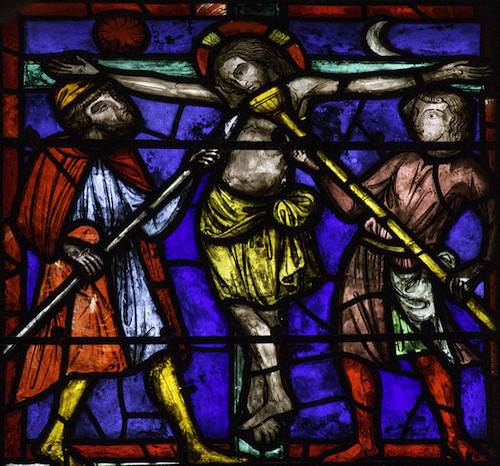We run our website the way we wished the whole internet worked: we provide high quality original content with no ads. We are funded solely by your direct support. Please consider supporting this project.

The Perfect Love of God
The Father, Son and Spirit exist as the infinite intensity and unsurpassable perfection of eternal love. We know this about the triune God not by speculation but because Jesus demonstrated that love (Rom 5:8) in his willingness to go to the furthest extreme possible to save us. When the all-holy God stooped to become our sin and our God-forsaken curse, which is the very antithesis of himself (2 Cor. 5:21; Gal. 3:13), he revealed the kind of love that God is. This is a love that could not possibly be made greater than it is.
Nothing could possibly reveal the love of the Trinity more than the God-forsakenness of the cross, as demonstrated when Jesus cries out, “My God, my God, why have you forsaken me?” (Matt 27:46). For the truth is, no sacrifice could possibly be greater than for Son of God to experience God-forsakenness on our behalf. How could anything be further from the Trinity—united in unsurpassable, intense love—than for God to experience his antithesis?
To support this claim, I want to quote a few people. Feldmeier and Spieckermann observe that Jesus’ revelation of God’s very nature as love “attained perfection in his Passion.”[1] Anders Nygren states that in the New Testament, “the Cross of Christ and the love of God are viewed as one.”[2] And Michael Gorman reasons: “If on the cross Christ conformed to God, then God ‘conforms’ to the cross.” In this light, Gorman argues, we can only conclude that “[t]he cross is the interpretive, or hermeneutical, lens through which God is seen; it is the means of grace by which God is known.”[3] In my estimation, there could not be a revelatory insight that is more important than this one.
The Crucifixion cannot be regarded as merely one of the many acts Jesus engaged in during his earthly life. Nor should we think that it is a mere contingent fact that God’s love is fully revealed on the cross, as though God could have just as easily expressed it in some other way. We need to grasp the logic inherent in the revelation of God in the God-forsaken criminal hanging on Golgotha. The cross is God’s quintessential revelation precisely because the unsurpassable perfection of the love that defines the Triune God throughout eternity is inextricably linked to the unsurpassable extremity of his sacrifice.
God is revealed to be a God whose love could not be improved upon precisely by making a sacrifice of love that could not possibly be improved on. The infinite intensity of the love that unites the three Persons is revealed in the infinite intensity of the pain God experienced when God the Son became his very antithesis and experienced sin and God-forsakenness on our behalf.
In this light, while we must affirm that everything about Jesus’ life and teachings reflects God’s loving character, I submit that it his sacrifice on the cross that does so most profoundly and most unambiguously. And it could not be otherwise, in my view. For only by condescending to dive an infinite distance into our hellish sin and God-forsakenness could the infinite intensity of God’s perfect love be expressed outside the triune community.
[1] Feldmeier, Spieckermann, God of the Living (Waco, TX: Baylor Univerisity Press, 2015), 127,
[2] A. Nygren Agape and Eros, trans. P. S. Watson (London: SPCK, 1953), 117
[3] M. Gorman, Cruciformity (Grand Rapids: Eerdmans, 2001), 17.
Photo credit: Lawrence OP via Visual Hunt / CC BY-NC-ND
Category: General
Tags: Cross, Cruciform Theology, God is Love, Jesus, Triune Love
Topics: Attributes and Character
Related Reading

The Incarnation: Paradox or Contradiction?
We’re in the process of flushing out the theology of the ReKnew Manifesto, and we’ve come to the point where we should address the Incarnation. This is the classical Christian doctrine that Jesus was fully God and fully human. Today I’ll simply argue for the logical coherence of this doctrine, viz. it does not involve…

How God Judges Sin
In his third sermon covering material from his book Crucifixion of the Warrior God, Greg explores the topic of judgment. In this clip, Greg suggests that while God certainly does judge sin, how he judges is very different than we might expect. You can view the entire sermon here on the Woodland Hills Church site. You can find the…

Podcast: Can We Really Have a Personal Relationship with Jesus?
It’s all about parts and wholes in this rip-roaring journey through the historical development of certain pietistic trends as Greg introduces his listeners to Depeche Mode Theology. http://traffic.libsyn.com/askgregboyd/Episode_0228.mp3

Reflections on the Supremacy of Christ (Part 1)
In my previous post I argued that the Bible tells a story in which the culminating event – the coming of Christ – reframes everything that preceded it. Though it is all inspired, not everything in it should carry equal weight for us. Rather, everything leading up to Christ, including the portraits of God, must…

Naturalism and the Historical Jesus
The quest for a “merely human” Jesus The various radical views of Jesus now being advocated by certain scholars and propagated through the press are buttressed by a number of different historical arguments. Some argue, for example, that the evidence from the first century suggests that Jesus was not unique in his healing ministry. Or,…

Interview with Frank Viola on his Book “God’s Favorite Place on Earth”
Today is the release date for Frank Viola’s new book, God’s Favorite Place on Earth. Greg did an interview with Frank recently, and in celebration of his book release, we’re sharing that interview here. If you read to the end you’ll see how you can get 25 free gifts if you purchase the book from…
